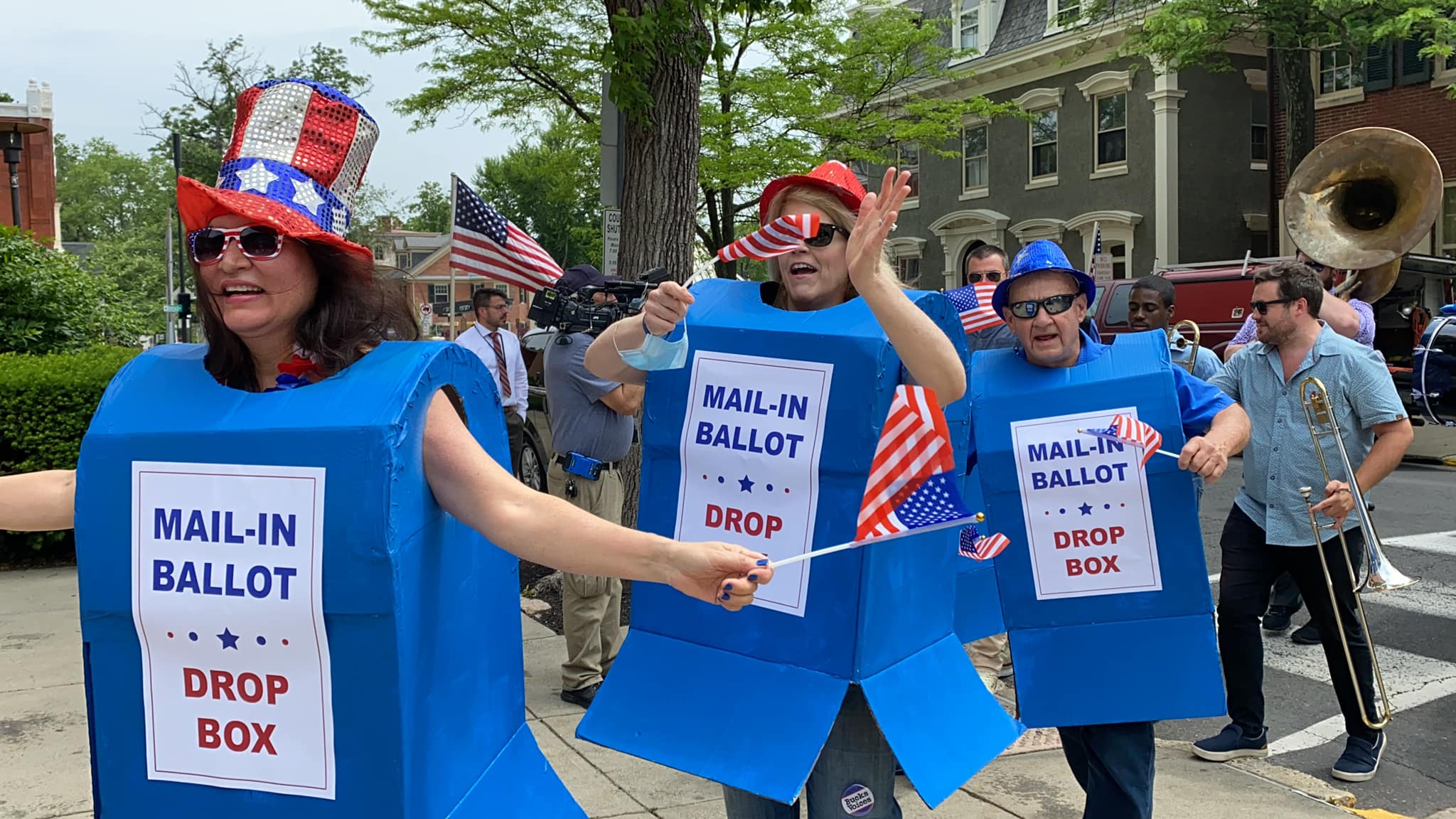Written by Gina Castro, Center for Public Integrity
A court decision finding no explicit right in Pennsylvania to “cure” absentee ballots rejected due to minor paperwork mistakes, along with state Republicans’ aggressive attempts to roll back widespread use of mail-in ballots, is setting the stage for chaos in this November’s midterm elections.
Along with a ban on outside funding of local elections and amidst an endless array of lawsuits over the particulars of voting by mail, it’s one of the most significant potential changes in how elections are run in Pennsylvania since 2020.
Gov. Tom Wolf, a Democrat, vetoed sweeping restrictions on the right to vote passed by the Republican-controlled state legislature last year. He said that proposed voter ID rules, “arbitrary” signature matching requirements for absentee ballots, and restrictions on voting by mail and the use of ballot drop boxes were “discriminatory” voter suppression tactics.
Voting rights advocates are bracing for reintroduction of such measures depending on what happens in the November midterms. Doug Mastriano, a right-wing conspiracy theorist Republicans have nominated to succeed the term-limited Wolf, has said he would have thrown out the results of the 2020 presidential election in Pennsylvania, which President Joe Biden won with virtually no evidence of fraud or errors in the vote count.
Pennsylvania adopted no-excuse absentee voting, with mail-in and drop box options, via bipartisan legislation in 2019. Then the COVID-19 pandemic sparked a surge of mail-in ballots during the 2020 presidential election.
At the time, state election codes didn’t spell out a process for fixing mistakes on absentee ballot applications. The Pennsylvania Department of State instructed county elections officials to permit ballot curing and to notify voters whose absentee or mail-in ballots were rejected so they could potentially cast a provisional ballot on Election Day.
County elections officials across the state had inconsistent policies for notifying voters of errors in their mail-in ballots. Some contacted the voter directly to give them the opportunity to correct an error, which was in accordance with the state’s guidance. Other counties simply didn’t count them.
Now, two years later, Pennsylvania’s murky ballot curing process continues to haunt the state’s elections.
A few weeks before the 2020 presidential election, the Supreme Court of Pennsylvania Middle District ruled that the state’s election codes don’t have a requirement for ballot curing, saying “the Election Code contains no requirement that voters whose ballots are deemed inadequately verified be apprised of this fact. Thus, unlike in-person voters, mail-in or absentee voters are not provided any opportunity to cure perceived defects in a timely manner.”
Ever since, Republican lawsuits have argued that the absence of ballot curing in the election codes means the prohibition of ballot curing in the state.
GOP congressional candidate Kathy Barnette was among the first to sue. She argued for cured ballots in Montgomery County to be tossed out due to the election code’s lack of parameters.
Montgomery County has allowed ballot curing for years. The state gives in-person voters six days to correct defects to their ballot, local officials have argued, so it’s only fair that voters who submitted absentee or mail in ballots be granted the same opportunity.
More lawsuits from Republicans were filed. A court ordered that 2,349 mail-in ballots submitted without dates on accompanying paperwork be counted in Allegheny County. In turn, this allowed 8,329 mail-in ballots in Philadelphia County to count, too.
Despite the state Supreme Court consistently backing the right to offer ballot curing, the lack of explicit requirement for it in state law will mean local election officials in various parts of Pennsylvania this fall are unlikely to offer it.
Democrats in Pennsylvania submitted nearly three times the number of mail-in ballots as Republicans during the 2020 presidential election, according to Politico.
There are a few technical errors that can result in mail in ballots being rejected.
The ballot must be enclosed and sealed in a security envelope titled “official election ballot.” Voters must sign and date the outer return envelope. Lastly, the ballot must be submitted to the voter’s county election board by 8 p.m. on Election Day.
In August, a judge ruled that ballots missing a date must be counted. Voters must still follow the other rules to avoid having their ballot rejected.
County election offices are required to promptly update a public tracking system if the ballot is rejected, however, so voters can check to see the status of their ballot and submit a provisional ballot in person on Election Day if they are able.
Banning outside funding of local elections
Earlier this year, Pennsylvania banned local officials from accepting grants from private foundations to supplement the cost of running elections. Copycat legislation fueled by conspiracy theories about Facebook founder Mark Zuckerberg have led to such bans in 24 states as of July of 2022, all with legislatures controlled by Republicans. Democratic governors in an additional six states blocked the legislation with vetoes.
Zuckerberg donated $350 million to a nonprofit, the Center for Technology and Civic Life, to support such grants as local election officials struggled with extra costs associated with providing access to voting in the COVID-19 pandemic in 2020.
Pennsylvania Republicans claimed bias in that more than 80% of the organization’s $22 million worth of grants in the state went to counties that Biden won in the 2020 presidential election. Election officials have noted that there’s no indication of favoritism.
Voting rights advocates have pointed to disparity in local resources to support opening of additional polling places, hiring of poll workers and establishment of drop boxes, among other expenses, as a key reason lower-income voters, disproportionately Black and Latino, face long lines on Election Day that can lead to disenfranchisement. Those voters are also more likely to support Democratic candidates.
Pennsylvania’s ban departs from the legislation adopted in other states in that it sets up a state grant program at the same time to help local governments with election costs in a limited number of circumstances. That’s a compromise that led Wolf to sign the bill rather than veto it as he did with other proposed voting restrictions.
Gerrymandering
Gerrymandered districts have been blamed for the fact Democrats haven’t controlled either house of the Pennsylvania legislature since 2010, even as voters have supported Democrats in statewide races by significant margins.
With Wolf and Republican legislative leaders at an impasse over redistricting following the 2020 census, the Pennsylvania Supreme Court approved new maps that should at least partially level the playing field.
Felony disenfranchisement
Nearly 49,000 people in Pennsylvania were prohibited from voting in 2020 because of incarceration on felony convictions, according to The Sentencing Project, an advocacy group.
More than 45% of the voters disenfranchised under that policy were Black, despite Black people representing 12% of the state’s population, Census Bureau data shows.
Voting rights are automatically restored after release from prison in Pennsylvania, but people must re-register, according to the National Conference of State Legislatures. Earlier this fall, Wolf signed an executive order requiring state agencies, including the Department of Corrections, to provide information about voter registration.
Correction: An earlier version of this story incorrectly reported that absentee ballots will be rejected this fall if they are missing a date. Although state law says they must be dated, a judge ruled in August that they can’t be thrown out for that reason.
This article first appeared on Center for Public Integrity and is republished here under a Creative Commons license.







